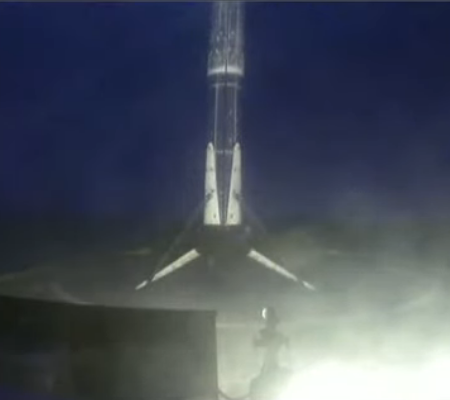SpaceX launches cargo Dragon to ISS using new 1st stage
Capitalism in space: In what will likely be its last launch in 2021, SpaceX early this morning successfully launched a reused Dragon cargo capsule to ISS.
This was the company’s 31st launch in 2021, extending its record for the most launches in a single year by a private company. The launch’s big news however was that the company used a new first stage booster, only the second time in 2021 that it needed to do so (the first was in May). The first stage successfully landed on the drone ship in the Atlantic, completing SpaceX’s 100th successful recovery.
The first such vertical landing had occurred in December 2015, and now six years later and after a hundred vertical landings, SpaceX remains the only orbital rocket entity in the world with such a capability. A very small handful of companies have performed tests with smaller scale prototypes, but that so much time has passed and no one has pushed forward to meet SpaceX’s challenge with even some full scale preliminary test flights does not reflect well on the innovative culture of the world’s rocket industry.
As for SpaceX’s yearly record, 31 launches actually exceeds the number of launches the entire U.S. rocket industry generally managed each year from 1970 through 2017. During much of that time the launch industry was run by NASA in a Soviet-style top-down system that stifled competition and innovation. Beginning in 2008, when SpaceX won its first contract with NASA, that system was abandoned by NASA, switching instead to capitalism and competition, whereby NASA was merely a customer buying its launches from the open market. The positive results from that change have been breath-taking, proving once again that freedom, competition, and private enterprise will win every single time over government programs and communist/socialist ideology.
The leaders in the 2021 launch race:
48 China
31 SpaceX
22 Russia
6 Europe (Arianespace)
5 ULA
5 Rocket Lab
The U.S. and China are now tied 48 to 48 in the national rankings. This was the 127th launch in 2021, tying it with 1976 for the second most successful year in rocketry in the history of space exploration. With five more announced launches on the schedule, there is a chance that this year could tie the record year, 132 in 1975.
Capitalism in space: In what will likely be its last launch in 2021, SpaceX early this morning successfully launched a reused Dragon cargo capsule to ISS.
This was the company’s 31st launch in 2021, extending its record for the most launches in a single year by a private company. The launch’s big news however was that the company used a new first stage booster, only the second time in 2021 that it needed to do so (the first was in May). The first stage successfully landed on the drone ship in the Atlantic, completing SpaceX’s 100th successful recovery.
The first such vertical landing had occurred in December 2015, and now six years later and after a hundred vertical landings, SpaceX remains the only orbital rocket entity in the world with such a capability. A very small handful of companies have performed tests with smaller scale prototypes, but that so much time has passed and no one has pushed forward to meet SpaceX’s challenge with even some full scale preliminary test flights does not reflect well on the innovative culture of the world’s rocket industry.
As for SpaceX’s yearly record, 31 launches actually exceeds the number of launches the entire U.S. rocket industry generally managed each year from 1970 through 2017. During much of that time the launch industry was run by NASA in a Soviet-style top-down system that stifled competition and innovation. Beginning in 2008, when SpaceX won its first contract with NASA, that system was abandoned by NASA, switching instead to capitalism and competition, whereby NASA was merely a customer buying its launches from the open market. The positive results from that change have been breath-taking, proving once again that freedom, competition, and private enterprise will win every single time over government programs and communist/socialist ideology.
The leaders in the 2021 launch race:
48 China
31 SpaceX
22 Russia
6 Europe (Arianespace)
5 ULA
5 Rocket Lab
The U.S. and China are now tied 48 to 48 in the national rankings. This was the 127th launch in 2021, tying it with 1976 for the second most successful year in rocketry in the history of space exploration. With five more announced launches on the schedule, there is a chance that this year could tie the record year, 132 in 1975.

